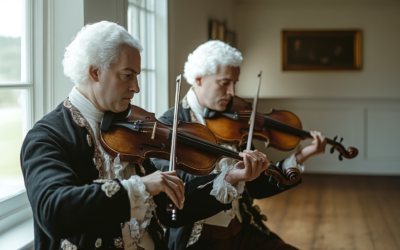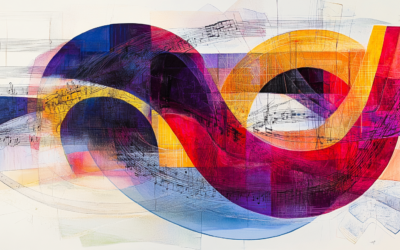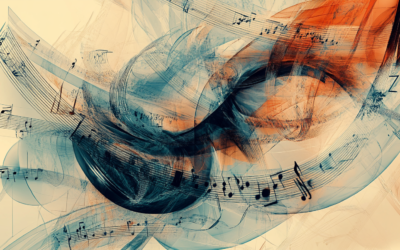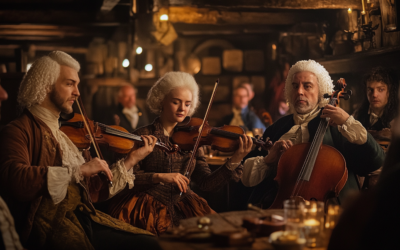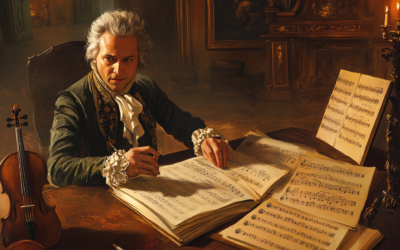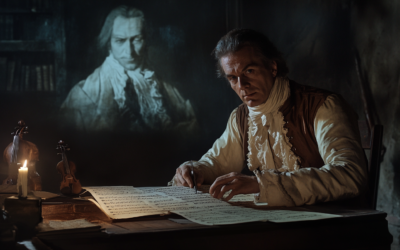Mozart Noir
The Hidden Influence of Joseph Boulogne, Chevalier de Saint-George
Joseph Boulogne, Chevalier de Saint-George, known as the “Black Mozart”, was a celebrated composer, violinist, and conductor in 18th-century Paris. Yet, his name is barely whispered in classical music circles, overshadowed by the very man whose career he helped define. Born in 1739 in Guadaloupe to a wealthy Frenchman and an enslaved African woman, Saint-George became a leading figure in Parisian music long before Mozart’s arrival, directing the famous Concert des Amateurs and influencing what we now call the Classical style. Saint-George’s influence on Mozart is undeniable, yet rarely acknowledged.
Mozart’s two Sinfonie Concertanti for violin and viola (K.364 and K.445) are often hailed as masterpieces of his “Viennese” style. However, there’s something curious about them: both works share the same orchestral arrangement as Saint-George’s own concertantes, and their innovative viola tuning—half a tone higher—echoes the daring style Saint-George employed years earlier. While historians date these works to 1779, they conveniently forget that Saint-George had already established this style in Paris a decade before.
Mozart: The Fall of the Gods
This book compiles the results of our studies on 18th-century music and Mozart, who has been revered for over two centuries as a deity. We dismantle the baseless cult of Mozart and strip away the clichés that falsely present him as a natural genius, revealing the contradictions in conventional biographies. In this work, divided into two parts, we identify and critically analyze several contradictory points in the vast Mozart bibliography. Each of the nearly 2,000 citations is meticulously sourced, allowing readers to verify the findings. This critical biography of Mozart emerges from these premises, addressing the numerous doubts raised by researchers.
"Saint-George's style was so advanced that even Beethoven would later adopt elements of his work, something Mozart—still clinging to his father’s baroque techniques—could never have dreamed of."
Mozart: The Fall of the Gods
Mozart’s legacy has been scrubbed clean of the influences that shaped his career, particularly the black composers like Saint-George who were rewriting the musical rules long before Mozart could. Saint-George, leading Europe’s finest orchestra, the Concert des Amateurs, introduced the very techniques that would later define Mozart’s so-called “genius”. But while Saint-George was a household name in Paris, performing at the Concert Spirituel and winning critical acclaim, Mozart was still struggling for recognition, hating both Paris and its music. By the time Mozart arrived in the French capital, Saint-George had already been dazzling audiences with his pioneering Symphonies concertantes and string quartets.
“Saint-George’s style was so advanced that even Beethoven would later adopt elements of his work, something Mozart—still clinging to his father’s baroque techniques—could never have dreamed of.”
The Paradox of Mozart’s Paris Experience
Mozart arrived in Paris in 1778, despising the French musical scene. In a letter to his father Leopold, he wrote, “Doesn’t the word Paris disgust you?”. And yet, while the young Austrian raged against Parisian culture, Saint-George was flourishing. He was leading Europe’s largest orchestra, performing in front of royalty, and defining the symphonic form that would soon be labelled “Classical”. Mozart, on the other hand, was living in the shadow of Saint-George’s success.
During this period, Mozart composed his famous Sinfonia Concertante K.364. The first five notes of its opening theme bear a striking resemblance to Saint-George’s Violin Concerto Op.7 No.2, composed just months earlier. Coincidence? Unlikely. Mozart and Saint-George lived under the same roof for over two months in the summer of 1778, dining together and, almost certainly, discussing music. The so-called “Mozartian” style was already well-established in Paris, long before Mozart tried his hand at it.
The Rise of the “Black Mozart”
While Saint-George’s compositions were more forward-looking, daring in their virtuosity and orchestration, Mozart’s music was often tied to the past, anchored in the Baroque techniques taught by his father. Saint-George used a modern bow, allowing for the virtuosic passages that would later be imitated by Paganini and even Beethoven. Mozart, by contrast, relied on Leopold’s outdated baroque bowing techniques. The gap between the two composers could not have been wider.
The Forgotten Innovator
Saint-George was not merely a skilled violinist; he was a visionary. By the time he was directing Concert des Amateurs, he had already revolutionised the symphonic genre. His symphonies and Concertantes bear more resemblance to Beethoven’s daring works than anything Mozart ever attempted. And yet, when Saint-George’s music is performed today, it is often underappreciated, if it is even recognised at all.
By the time Saint-George retired from composing, his legacy was already being buried under the overwhelming cult of Mozart. It is no accident that Saint-George was dubbed the “Black Mozart”. He was the genius behind the innovations that shaped the “Viennese” style, long before Mozart could claim it as his own.
You May Also Like
The Mysterious Case of Mozart’s Duets: An Unfinished Story
Mozart’s string duets have long been shrouded in mystery, from his father’s heavy influence in 1768 to his supposed act of charity for a dying Michael Haydn in 1783. These unfinished works reveal more about the composer’s life and struggles than they do about his musical genius.
The Misattribution of Mozart’s K.2 89a (K.6 73i): A Questionable Canon
K.2 89a (K.6 73i), attributed to Mozart, is riddled with issues—missing voices, incomplete harmonies, and even the absence of text. Should this piece really be in his catalogue?
The Borrowed Simplicity: Mozart’s Canons K.555, K.557, and K.562
The canons K.555, K.557, and K.562, often overlooked for their simplicity, reveal striking similarities with the works of Antonio Caldara. These three pieces, dated 1788, demonstrate how Mozart adapted and simplified Caldara’s contrapuntal structures, masking his influences while reflecting the galant style of the era.
Mozart’s Quartet of Lodi: A Dated Work with Many Influences
Mozart’s Quartet of Lodi is often praised as an early masterpiece. But was it really his own work?
Mozart’s Violin Pieces: Substitutes for Failed Movements?
Despite revisions, Mozart’s violin concertos remain flawed, while his minor pieces, K.261 and K.373, surprisingly garner more attention in his correspondence than his major works.
The Questionable Origins of Mozart’s Violin Concertos
Are Mozart’s violin concertos truly original? This article explores the possibility that the Czech composer Josef Mysliveček played a far larger role in their creation than previously acknowledged.


